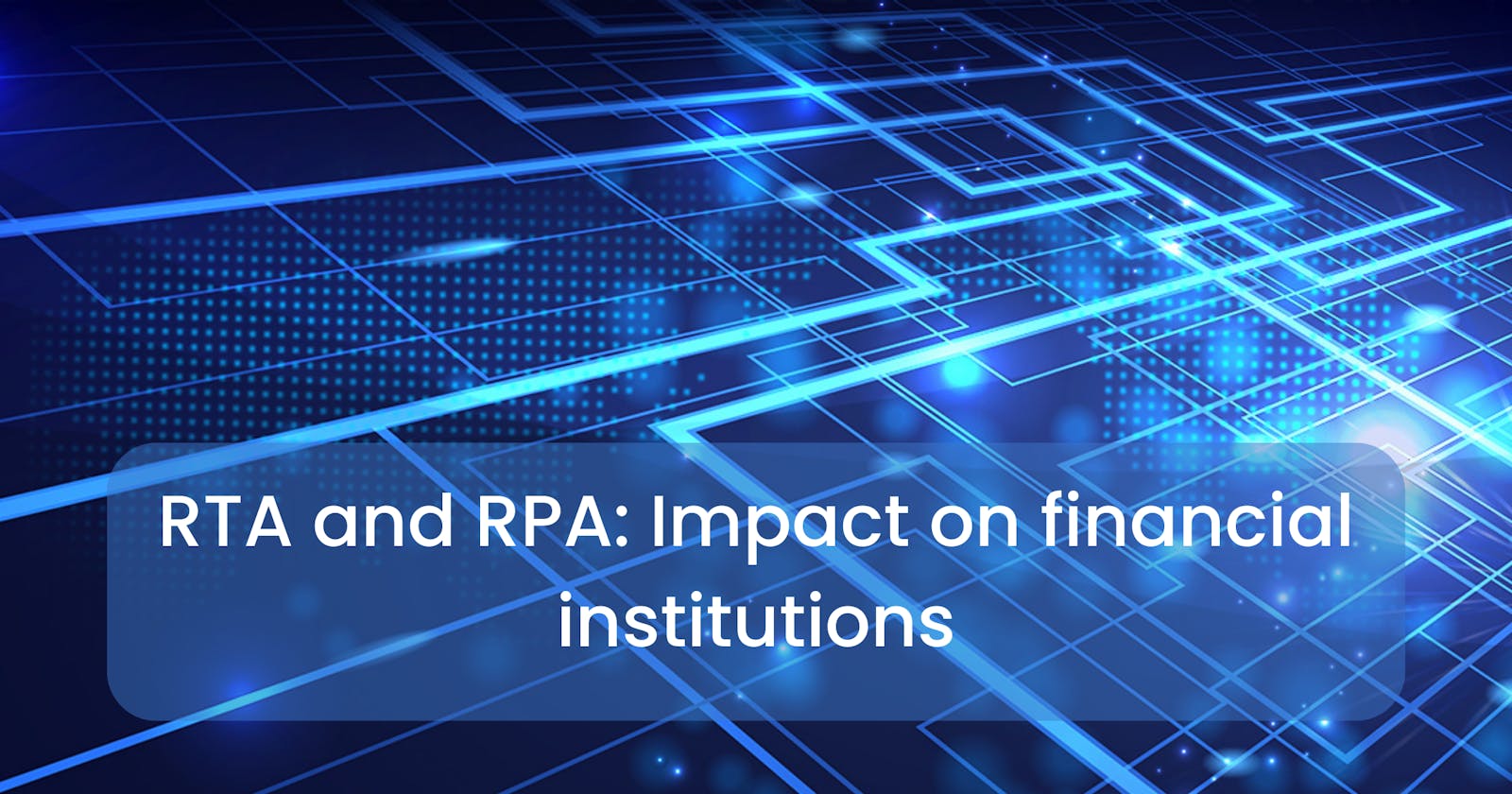The current technology-driven era has embraced intelligent technologies, like Robotic Process Automation (RPA) and Robotic Test Automation (RTA), which have a significant impact on the banking and financial sector, thereby, reshaping the way they operate.
RPA and RTA are significantly being used in the highly dynamic and constantly evolving banking and financial sector. These robotic bots integrated process automation and test automation have helped organizations in the BFSI industry to achieve scalable, stable, and responsive models for greater accuracy and consistency.
RPA and RTA, often confused to be the same have little in common. With a fair amount of distinction, the outcome of RTA is not the same as RPA. However, as both streamline the operations and improve efficiency and productivity by reducing cost and time for development, often Robotic Process Automation is used instead of RTA.
The article highlights how RTA is an ideal approach to speed up the automation testing process. RPA helps to automate a process by eliminating the manual execution of tedious, repetitive, and mundane jobs, while RTA significantly increases the process of regression testing by eliminating the necessity of creating and maintaining test scripts.
What is RTA? How is the financial sector benefitted?
Robotic Test Automation (RTA) is a revolutionary technology that has changed the ROI metrics of software testing based on a real-world scenario, by robotically generating, executing, and maintaining test records. Unlike RPA, where only automation of a particular process is carried out, RTA can be used to automate multiple processes all at the same time.
RTA eliminates the hassle of repeatedly testing the entire case by automating with a no-code or minimal-code interface. Further, it removes the inefficiencies and time-consuming procedures involved in the manual creation and maintenance of test cases. Automating test cases under this scenario will be beneficial as test automation can help in reducing the regression burden saving time and money.
In highly complex and diverse banking and financial applications, the core software system has a high volume, of sensitive data of various categories. These data-driven applications often tend to be highly volatile and require extensive validation, which if done manually can be time-consuming, expensive, and compromise accuracy. RTA is the perfect solution for testing banking and financial software as it automates multiple cases and eliminates the bottlenecks associated with manual testing. Thereby, improving the test accuracy and reducing the time for conducting the test.
Benefits of RTA:
- Flexibility of working on multiple processes at the same time
- Exhibits a distinctive configuration
- Supports continuous testing
- Minimal/ no code
- Cost-cutting technology
- Increases the productivity rate
- Accurate and consistent
What is RPA? How financial sector is benefitted?
Robotic Process Automation or RPA is a software bot designed to mimic human behaviour and automate high-volume, data-intensive, and repetitive tasks. It improves agility and reduces the complexity in the data-entry cycle, capturing data, triggering responses, and communicating with other systems; thereby, delivering error-free output and completing the task efficiently and effortlessly.
RPA is an advanced, robotic process integrated with Artificial Intelligence (AI) and Machine Learning, it is optimized for a large volume of transaction entries for a limited process set. RPA documentation is primarily around process execution and process volumes.
Why RTA, not RPA, is the right solution for testing banking and financial applications? Even if RPA and RTA have robotic approaches, they cannot be confused to be the same. RPA is used to automate a few processes that are repetitive and mundane for a large volume of repetitive cycles; in contrast, RTA is used to conduct testing across multiple or all processes for a relatively lower volume of cases all at the same time. Both are optimized for different use cases and therefore cannot be considered supplementary solutions.
In the complex banking environment, a strong and resilient testing process is required that can offer 100% accuracy, agility, and consistency. RPA may fail to live up to the expectation when it comes to handling the complex, sensitive, and diverse system of the banks’ core software and often turn out to be inefficient to adapt to the changes. RTA, on the other hand, automates the testing of various test cases individually and performs regression testing each time a change is made in the system.
RTA provides the opportunity to test the entire case at different levels of complexity, which cannot be easily performed by manual efforts. With the incorporation of RTA in place, banks/ financial institutions witness a drastic transformation in the core operations and improved profit margins, hence, slowly but surely it is becoming the right solution for the banks/ financial institutions.
Yethi’s robotic test automation tool, Tenjin, for agile and accurate solutions to the financial sector
Tenjin, Yethi’s test automation tool, is an easy-to-integrate, codeless automation platform, which is designed to rapidly scan through the software and detect errors. This innovative platform works 3x times faster than any other automated testing system. It is designed for seamless integration across all operating systems, platforms, and versions, and its plug-in and play simplify the testing process along with a comprehensive defect management system. Tenjin can test at various levels, conduct regression testing, perform shift left testing, and deliver results with speed and accuracy.
Yethi Consulting is a niche QA service provider that has helped banking/financial organizations globally with an efficient test automation solution. We work towards improving the efficiency of the organization’s core software system, thereby, increasing agility, consistency, and accuracy. Our revolutionary solution has taken the test automation to next level with an accuracy rate of nearly 100%.
